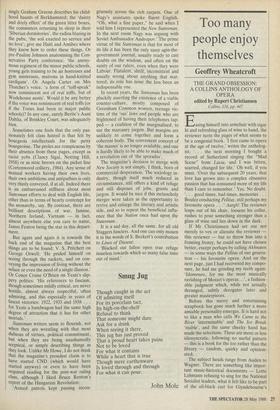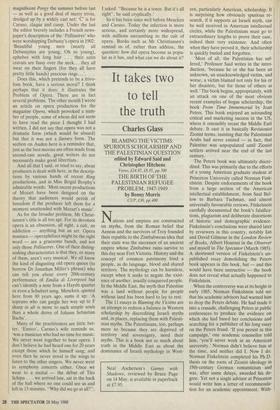Too many people enjoy themselves
Geoffrey Wheatcroft
THE GRAND OBSESSION: A COLLINS ANTHOLOGY OF OPERA edited by Rupert Christiansen
Collins, fI6, pp. 447
Easing himself into armchair with cigar lit and refreshing glass of wine to hand, the reviewer turns the pages of what seems to be a congenial book. 'I first came to opera at the age of twelve,' writes the antholog- ist; `. . . the next morning I bought a record of Sutherland singing the "Mad Scene" from Lucia, and I was bitten, scarred, changed for life.' Oh well, if you must. 'Over the subsequent 20 years, that love has grown into a complex obsessive passion that has consumed more of my life than I care to remember.' Yes. No doubt. `. . . good times, bad times, memories . . . Boulez conducting Pelleas, still perhaps my favourite opera . . .' Aargh! The reviewer leaps out of his chair, loosens his collar, rushes to pour something stronger than a glass of wine and lies down in the dark.
If Mr Christiansen had set out not merely to vex or alienate the reviewer this reviewer — but to throw him into a foaming frenzy, he could not have chosen better, except perhaps by calling Akhnaten — in some ways the Pelleas of our genera- tion — his favourite opera. And on the next page, just I had recovered my compo- sure, he had me grinding my teeth again: `Idomeneo, for me the most musically ravishing of Mozart's operas...', a fashion- able judgment which, while not actually deranged, subtly derogates later and greater masterpieces.
Before this merry and entertaining scrapbook has gone much further a more amiable personality emerges. It is hard not to like a man who calls We Came to the River 'interminable' and The Ice Break `risible', and the same cheeky hand has made the selections. These are more or less idiosyncratic, following no useful pattern — this is a book for the loo rather than the library — random, quirky and opinion- ated.
The subject heads range from Auden to Wagner. There are something like impor- tant music-historical documents — Lotte Lehmann refusing to sing for the National Socialist leaders, what it felt like to be part of the all-black cast for Glyndebourne's
magnificent Porgy the summer before last — as well as a good deal of merry trivia, dredged up by a widely cast net: 'C' is for Caruso, claque and camp. Under the last the editor bravely includes a French news- paper's description of the Telleastres' who were worshipping Debussy's opera in 1902: 'Beautiful young men (nearly all Debussyites are young, Oh so young), ephebes with long hair . . . their satin cravats are fussy over the neck... they all wear on their fingers (for they all have pretty little hands) precious rings...'.
Does this, which pretends to be a frivo- lous book, have a serious moral? I think perhaps that it does: it illustrates the Problem of Opera. There are in fact several problems. The other month I wrote an article on opera production for the magazine Opera, which provoked a num- ber of people, some of whom did not seem to have read the piece I thought I had written. I did not say that opera was not a dramatic form (which would be absurd) but that it was not a literary form. The section on Auden here is a reminder that, just as the best movies are often made from second-rate novels, great writers do not necessarily make good librettists.
And all that I said, or tried to say, about producers is dealt with here, in the descrip- tions by various hands of recent Ring productions, and in Miss Brigid Brophy's admirable words: 'Most recent productions of Mozart have been designed on the theory that audiences would perish of boredom if the producer left them for a moment unattended with Mozart's music'.
As for the broader problem, Mr Christ- iansen's title is all too apt. For its devotees opera is an obsession, all right, a cult, an addiction — anything but an art. Opera maniacs — operaphiliacs might be the right word — are a gruesome bunch, and not only those Pelleastres. One of their disting- uishing characteristics is that they, or many of them, aren't very musical. We all know the kind of disgusting old opera queen (to borrow Dr Jonathan Miller's phrase) who can tell you about every 20th-century performance of Emilia di Liverpool but can't identify a note from a Haydn quartet or even a Schubert song. Mencken, quoted here from 80 years ago, sums it up: 'A soprano who can gargle her way up to F sharp in alt is more to such simple souls than a whole drove of Johann Sebastian Bachs'.
Many of the practitioners are little bet- ter. 'Enrico', Caruso's wife reminds us, 'was a musician who had no time for music. We never went together to hear opera. I don't believe he had heard one for 20 years except those which he himself sang; and even then he never stood in the wings to listen to the other singers. We never went to symphony concerts either. Once we went to a recital — the debut of Tito Schipa . . . we arrived late, sat in the back of the hall where no one could see us and left in 15 minutes. "Why did we go at all?", I asked. "Because he is a tenor. But it's all right", he said cryptically.'
So it has been since well before Mencken and Caruso. Today the infection is more serious, and certainly more widespread, with millions succumbing to the cult of opera. Books such as Mr Christiansen's remind us of, rather than address, the question: how did opera become as popu- lar as it has, and what can we do about it?



















































 Previous page
Previous page